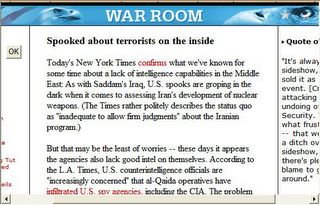
Spooked about terrorists on the inside
Today's New York Times confirms < http://www.nytimes.com/2005/03/09/international/09weapons.html?hp&ex=1110430800&en=48649e4ca2d8893d&ei=5094&partner=homepage> what we've known for some time about a lack of intelligence capabilities in the Middle East: As with Saddam's Iraq, U.S. spooks are groping in the dark when it comes to assessing Iran's development of nuclear weapons. (The Times rather politely describes the status quo as "inadequate to allow firm judgments" about the Iranian program.)
But that may be the least of worries -- these days it appears the agencies also lack good intel on themselves. According to the L.A. Times, U.S. counterintelligence officials are "increasingly concerned" that al-Qaida operatives have infiltrated U.S. spy agencies,
"So far, about 40 Americans who sought positions at U.S. intelligence agencies have been red-flagged and turned away for possible ties to terrorist groups," said counterintelligence officials, according to the L.A. Times. That number includes "several applicants" detected at the CIA.
"Fear of possible penetration has grown because of what one official called 'an intense competition' among America's intelligence, military and contractor organizations. They are seeking to hire thousands of skilled linguists, trained analysts and clandestine operatives who can blend into overseas communities to collect intelligence and to recruit foreign agents inside terrorist cells.
"In some cases, the officials said, those most qualified for such sensitive jobs -- naturalized Americans who grew up in the Middle East or South Asia, for example, and who are native speakers of Arabic, Farsi, Dari, Urdu and other crucial languages -- have proved the most difficult to vet during background checks. In addition, because of restrictions imposed by U.S. privacy laws, authorities at one spy service may not know that someone they had rejected later found a job at another agency or at a defense contractor working on classified systems."
Perhaps privacy laws are part of the problem, but what about the ongoing bureaucratic mess < http://www.salon.com/politics/war_room/2005/03/07/hsd/index.html> that is the Bush administration's Department of Homeland Security? It seems the administration's reorganization of the intelligence apparatus into one super-agency hasn't done much to improve efficiency; various agencies still rely on outsourcing for vetting recruits. "With vast increases in funding from Congress after the 2001 attacks, " the L.A. Times report continues, "the 15 U.S. intelligence agencies launched sweeping recruitment programs. Most have been deluged with thousands of resumes and job applications, forcing several spy services to contract background checks to private firms.
"Paul Redmond, a longtime CIA officer who works for the counterintelligence office, called it an 'actuarial certainty' that spies have infiltrated U.S. security agencies. He warned that, because of efforts since Sept. 11 to more widely share critical intelligence as part of broader reforms, the danger of espionage was growing. 'I think we're worse off than we've ever been,' he said."
There are a couple other striking segments in the report, drawn from a national conference on counterintelligence held last weekend at Texas A&M University. For one, the threat of infiltration isn't only from Islamic extremists, and isn't limited to the government sector. Lisa Bronson, the undersecretary of defense in charge of vetting exports of defense-related materials, told conference goers that "2,000 to 3,000 front companies" inside America are working to obtain so-called dual-use civilian equipment or information that could be used to help China's military.
And there were some rather intriguing comments made by the first President Bush, who served as CIA chief in the late 1970s.
"George H.W. Bush, whose presidential library is at Texas A&M, opened the weekend conference with a fervent defense of the CIA. Bush said it 'burns me up to see the agency under fire' for flawed intelligence on prewar Iraq."
The White House blame game has burned up a number of other folks
-- Mark Follman
No comments:
Post a Comment